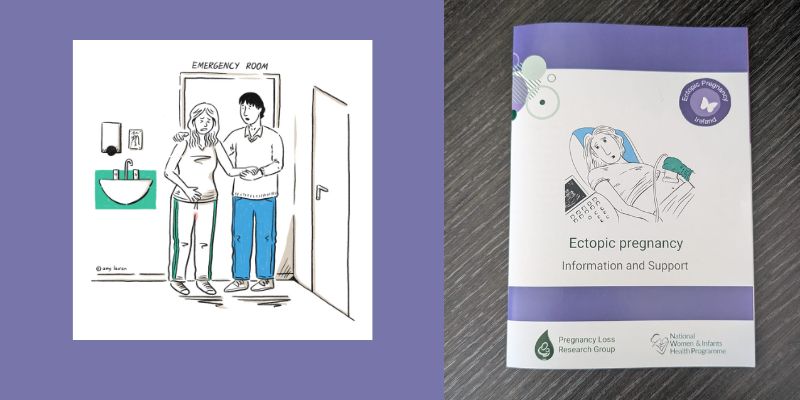News and media
New information and support resource about Ectopic Pregnancy

A new information booklet on Ectopic Pregnancy is being launched this September. This resource was developed by the Pregnancy Loss Research Group and Ectopic Pregnancy Ireland, in close collaboration with National Women and Infants Health Programme (NWIHP), healthcare professionals in maternity services, and people with lived experience of ectopic pregnancy.
Dr Cliona Murphy, National Clinical Director of the National Women and Infants Health Programme (NWIHP) highlighted:
The launch of this booklet marks a significant step in supporting people who experience ectopic pregnancy in Ireland with evidence-based, compassionate information and care.
The booklet incorporates both clinical expertise and the voices of those directly affected, offering clear explanations of risk factors, symptoms, treatments, and recovery, as well as information on emotional support and partner involvement. The booklet is unique in Ireland for its collaborative approach, the inclusion of direct quotes from people with lived experience, and for accompanying artwork by the artist/illustrator Amy Lauren, all in the interest of creating an accessible, practical resource for the public.
Professor Keelin O’Donoghue, Consultant Obstetrician shared:
This booklet is a vital step in ensuring that people facing an ectopic pregnancy are given clear, compassionate, and reliable information at a very distressing time. Our goal is to help women and their families understand what is happening, feel supported in their care, and know that they are not alone in this experience. Good information empowers patients, and we hope this resource will provide both knowledge and reassurance when it is most needed.
Ectopic pregnancy occurs when a fertilised egg implants outside the correct position inside the uterus, most commonly in the fallopian tube. In Ireland, approximately 1 in 80 pregnancies is ectopic. While uncommon, it is a serious medical condition that can be life-threatening if not treated but is almost always managed successfully when diagnosed early. Those affected by ectopic pregnancy experience not only the physical impact of pregnancy loss but also significant emotional turmoil.
Jenny Ryan, on behalf of Ectopic Pregnancy Ireland stated:
We hope the booklet will be both informative and supportive to anyone concerned about or impacted by an ectopic pregnancy.
Key points from the booklet and national guidance
- Diagnosis: Early recognition of symptoms (pain, abnormal bleeding, dizziness, fainting) and access to Early Pregnancy Units are crucial.
- Management options: Expectant, medical (methotrexate injection), and surgical management available, dependent on individual circumstances.
- Emotional impact: Ectopic pregnancy can be a frightening, life-threatening experience and is a form of pregnancy loss, requiring structured emotional support. This need is addressed in the National Standards for Bereavement Care Following Pregnancy Loss and Perinatal Death.
- Follow-up care: Hospital review post-treatment and early ultrasounds in future pregnancies are advised.
- Recurrence: Risk of recurrence is higher following an ectopic pregnancy (7-10%); however, most subsequent pregnancies end up being healthy. Early scan recommended at 6 weeks in subsequent pregnancies.
The Ectopic Pregnancy booklet is the latest in a suite of national resources and guidelines.
The Pregnancy Loss Research Group (PLRG) and the National Women and Infants Health Programme (NWIHP) have developed multiple national resources to improve understanding and care surrounding pregnancy loss, including ectopic pregnancy:
- Comprehensive information booklets for miscarriage, recurrent miscarriage, and ectopic pregnancy, with other pregnancy loss areas forthcoming.
- National Clinical Guidelines (offering evidence-based recommendations for diagnosis, management, and follow-up care for ectopic pregnancies, among other health areas), a programme of work agreed between the National Women and Infants Health Programme (NWIHP) and the Institute of Obstetricians and Gynaecologists of the Royal College Physicians of Ireland.
Support and further information
- Ectopic Pregnancy Ireland: Support and advocacy group, contributor to the information resource.
- Pregnancy Loss Research Group: PLRG's central hub for research and patient support resources.
- National Women and Infants Health Programme (NWIHP): Development of clinical guidelines (PDF of the national clinical practice guideline: The Diagnosis and Management of Ectopic Pregnancy, and a plain language summary of the guideline).


